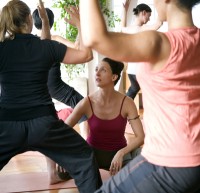 Wellington yoga teacher Alison Tilley has started a petition against ACC’s high levies for yoga teachers.
Wellington yoga teacher Alison Tilley has started a petition against ACC’s high levies for yoga teachers.By Laura Brookes
If ACC’s got it right, all New Zealand yoga teachers should be on immediate hazard alert.
They currently face the same risk of injury in their workplace as downhill ski instructors.
Yoga instructors are charged $1.37 for every $100 earned in ACC levies, a higher rate than prostitutes ($0.40), firefighters ($0.92) and professional netball players ($1.31).
ACC groups yoga instruction into the classification unit for Sports and physical recreation instruction, meaning they pay the exact same levy rate as their fellow aerobics instructors, kick-boxing instructors and downhill ski instructors.
Wellington-based yoga teacher, Alison Tilley, recently had her levy rates changed to meet this criteria after calling ACC’s Business Support Centre on March 30 to query a 2.4 per cent “adjustment for inflation” from her previous income.
After a series of questions about Tilley’s work, an ACC supervisor changed her levy to classification unit 84500, which made her no longer an “operator”, but a Sports and physical recreation instructor.
This means Tilley’s levy fees have now doubled, from an initial $0.70 to $1.37 for every $100 earned.
“I was almost screaming [at ACC] on the phone because I was so frustrated,” Tilley says.
“Yoga teachers are currently in a medium to high-risk category, being charged more than personal trainers and dance teachers… except yoga instruction is comparatively low risk, and far less risky than teaching aerobics.”
The Wellingtonian has now started an online petition calling for ACC to take yoga teachers out of the medium to high-risk category, calling the current classification “arbitrary and miscategorised”.
“I was previously categorised under classification unit 93120 – Sports and physical recreation venues, grounds and facilities operation, which I thought was fair, and that was low, but when I spoke to them, they said, “no, no, no… you’re in a much more expensive category”, she says.
“I begged her to keep me at the old rate, but she said that because I teach yoga classes, on top of running the business operations, I had to be charged the higher fee.
 But Alison Tilley says this distinction is “arbitrary and miscategorised”. Photo: Melissa Billington teaching.
But Alison Tilley says this distinction is “arbitrary and miscategorised”. Photo: Melissa Billington teaching.“The fact that I spend most of my time operating the business from my office was not taken into account.”
Tilley’s requests to be re-classified under Adult community education with instructing diet, exercise and lifestyle factors or as a Personal health and fitness trainer were denied by ACC.
“As the director of Sadhana Yoga, I thought I’d be running a challenge that has got diet, exercise and lifestyle factors, and educating adults in the community, but apparently I’m not,” she says.
“We don’t just teach physical exercises to take away, you come to the class to be immersed in that class, and receive personalised help… yes, you might teach down dog, but somebody else is going to teach it differently. Not all yoga classes are the same.”
According to ACC, any “personal service” operates on the basis that one-on-one training is provided.
Tilley was later contacted by ACC Advisor of Government Services, Anne Fitzgerald, who disclosed yoga injury statistics dating back to 2005 in response to her OIA request.
In a letter, Fitzgerald said: “While ACC collects information on sports and recreation activities, yoga is not an activity that is specifically measured. ACC is unable to provide yoga statistics prior to 2011 because the data is unreliable and would not provide statistics relevant to your request.”
The response goes on to say ACC “[cannot] identify those undertaking yoga from other sports and physical recreation instructors in the classification unit. Therefore, due to the limitations of the data that ACC collects, it has not been able to locate the actual number of claims in relation to yoga instructors”.
ACC later confirmed 1700 claims were received for the classification unit Sports and physical recreation instruction during 2014, and of these, approximately 10 claims were identified with a free-text search of the word ‘yoga’.
Comparatively, dance and ballet instructors, who pay ACC significantly less than yoga teachers do ($0.26 for every $100 earned), had 212 active claims within the same 12-month period, costing the company more than $230, 000.
ACC operates under the recommendation of the 2006 Australian and New Zealand Standard Industrial Classification (ANZSIC), which works with the Australian Bureau of Statistics (ABS) to provide ACC with a “conceptual basis” for determining how activities should be classified into risk groups.
Developed in the early 1990’s by ABS and Statistics New Zealand, ANZSIC aimed to make comparison of trans-Tasman and international statistics easier.
ANZSIC classifies yoga (along with tai chi) as a type of Sports and physical recreation instruction, as neither ANZSIC nor ACC have a specific classification unit for yoga.
ACC confirmed that in each case of sports instruction, the ACC levy reflects the injury cost history of the relevant classification unit.
Tilley, who worked as a professional aerobics instructor for 15 years before starting up her Miramar-based business, Sadhana Yoga, says the “growth of yoga as a global industry” should require ACC to recognise yoga by creating a brand new classification unit.
However, ACC Senior Advisor of Government Services, Nancy Robbie, says this “growth” is not yet evident in the New Zealand market, and therefore is unlikely to change the classification.
“Yoga instruction as an activity is too small in New Zealand to have its own CU.”
“Typically, earnings within an activity of at least $20-30 million are required to produce any statistically required information required for the levy setting process. Consequently, yoga instruction will continue to be grouped with other related activities at the CU level.”
With more than 300 signatures on her petition so far, Tilley hopes to convince yoga enthusiasts from around New Zealand that ACC rates should reflect an actual risk of injury, and says it has been her sole focus since first discovering the disparity on 30 March 2015.
“Someone asked me what I was going to do about it, and I told them I had no idea… I’ve never done anything like this before, taking on a government agency with lawyers like the ones ACC have,” says Tilley.
“When I discovered I could start a petition, and take it around New Zealand, or to all the yoga studios, I knew that’s what I needed to do.
“They’ll find any way not to change, or not to pay, or not to do anything.”
Tilley also plans to submit an Application of Review to ACC within the next month, requesting changes to her business’ levy fees, and to prepare a submission for ACC’s next public forum in September, where classification units are reviewed on an annual basis.
“What the ANZSIC needs to do is change their view of yoga, since ACC look to them for their classifications. Yoga is an aesthetic exercise, not an active exercise, and I’ve actually got documentation on that,” Tilley says.
“In the meantime, I’m doing this all alone, hanging out in ACC terror, and no one else knows what’s going on. I’m just so upset… and I’m having to give up teaching classes because of it.”
ACC Senior Media Advisor Stephanie Melville says ACC is “very happy” to review Tilley’s submission in September and consider re-evaluating their current levy rates.
“I can certainly appreciate what her sense is… the business is very happy to look at [her submission] and consider changing the levy based on that, but for now, that’s what she needs to do,” says Melville.
However, Tilley remains unconvinced, and says her experience to date has shown ACC “are only protecting their own interests. As for the rest of us, we’re supposed to keep our heads down and not cause a fuss”.
“Everybody’s pointing towards the fact that yoga is gentle, except the freaking ACC, and obviously it’s worth their while to charge us because they get more money, but it’s not based on a fair system.
“It’s a bloody kick in the teeth for yoga teachers.”
Sounds like it might just be time for ACC to roll up their mats and go home.


Well done Laura and Kara-Leah … hopefully we are riding the wave of positive change
Thanks to Ali for championing this cause! Having run my own studio for 5 years in Wellington, I know all too well how challenging it is & how every cent can count when it comes to making or breaking a yoga business. May more folks sign the petition!!!
I think charging yoga teachers more is ridiculous, preposterous and not based on any evidence I am aware of.